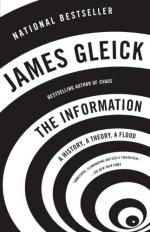
|
| Name: _________________________ | Period: ___________________ |
This quiz consists of 5 multiple choice and 5 short answer questions through Chapter 12.
Multiple Choice Questions
1. Gleick presents his intention to trace the growth of both the concept of information and information itself by identifying what key elements?
(a) Origin and reliability of sources.
(b) Nation and type of governance.
(c) The people and thinking that contributed to it.
(d) Society and culture.
2. What did Chaitin mean by a "computable" number?
(a) A number that is not a variable.
(b) A number that could be expressed in its square root value.
(c) A number that can be calculated.
(d) A number that could be expressed in a simpler form.
3. Who devised a way to multiply and divide numbers by adding or subtracting their logarithms?
(a) Aristotle.
(b) John Napier.
(c) Isaac Newton.
(d) Thomas Fincke.
4. What process can measure the limits of the human mind?
(a) Information theory.
(b) Information technology.
(c) Knowledge management.
(d) Psychoanalytical evaluation.
5. What was one of the innovative concepts that Dawkins proposed in "The Selfish Gene"?
(a) A meme.
(b) The genome.
(c) The extra gene.
(d) The repressive gene.
Short Answer Questions
1. What is an algorithm?
2. What does the word "cybernetics" mean?
3. How did sub-Saharan African tribes communicate over long distances?
4. What type of information is contained in DNA?
5. In his graduate paper, to what did Claude Shannon apply the binary logic of George Boole?
|
This section contains 286 words (approx. 1 page at 300 words per page) |

|




